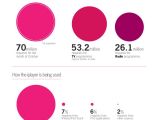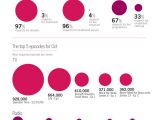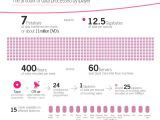There is a great need for TV content online. The sheer amount of illegal ways of getting to it is evidence enough, but in recent years, companies are starting to realize that rather than just spend millions on trying to prevent piracy it would be much easier and more profitable to meet the needs of the consumer. In the US, Hulu has been a huge success and is now the second biggest video in the country. In the UK, there's the BBC's iPlayer which has seen, arguably, the same level of success though there are some major differences between the two services.
UK business news site, CXO met with BBC's CTO John Linwood, a former Yahoo exec, to get some details on the project and has also provided some interesting stats wrapped up in a very stylish and overwhelmingly pink chart graph. The chart is full of big numbers like 12.5 gigabytes of data transferred every second adding up to seven petabytes every month. In total over 400 hours of content are encoded every week either from taped shows or live events.
But, there are also some relevant stats in there as well. For example, the player served 70 million streams in October, 53.2 million of which were for TV programming. Radio is very popular in the UK but the big number of radio programming streams, 26.1 million, comes from the fact that using the iPlayer for audio content means that users can do something else in the mean time, helpful, especially on mobile platforms.
Also interesting is the distribution of the users. BBC's iPlayer is available for 12 platforms, but the majority of users, 85 percent, tune in on their desktops. Just seven percent use it on their iPhone or iPod Touch devices and a surprising six percent on Sony's Playstation 3 video games console. The mobile usage numbers could be even bigger, but the player will only work when the devices are using a WiFi connection, a concession the BBC has had to make after complaints from mobile phone carriers that they couldn't handle the traffic on their 3G networks.
Anyway, despite concerns from ISPs about the strain it puts on their networks, more likely spurred by the fact that the service is threatening their cable businesses rather than actual bandwidth concerns, one of the biggest issues the service is facing is keeping up with demand.
"One of the challenges we share with many other suppliers on the internet is that our user demand on the systems changes. For instance, if we have a very popular show on iPlayer and we get a huge speak in demand," Linwood told CXO. "One example that is keeping me awake at night is the 2012 Olympics. We know that people will be accessing it from their PCs or their phones because it will be on in the daytime so the BBC is going to have to build up a huge amount of infrastructure to support that."

 14 DAY TRIAL //
14 DAY TRIAL // 


